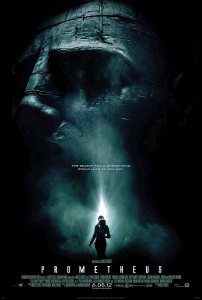 Then I got to pick up a movie that I’ve long regretted missing out on, by virtue of it apparently being a recommended reference piece for the latest in quality surround sound.[1] I would never have been so obsessed with seeing Prometheus if I had not known about its connection into the Alien mythos, a series with which I am quite obsessed indeed. I find it ironic, therefore, that the huge failing of the movie is that Ridley Scott thought he could make a science fiction movie by drawing so strongly on the same elements that made Alien one of the best horror movies of all time.
Then I got to pick up a movie that I’ve long regretted missing out on, by virtue of it apparently being a recommended reference piece for the latest in quality surround sound.[1] I would never have been so obsessed with seeing Prometheus if I had not known about its connection into the Alien mythos, a series with which I am quite obsessed indeed. I find it ironic, therefore, that the huge failing of the movie is that Ridley Scott thought he could make a science fiction movie by drawing so strongly on the same elements that made Alien one of the best horror movies of all time.
See, there are these archaeologists, and they have found evidence in the records of a dozen ancient cultures that aliens were once among us. Better yet, they found a map. Off they go (courtesy of the Weyland Corporation, its Yutani partnership still in the murky future) to meet said aliens and see what can be learned from them or their remains. (After all, it’s been a while since anyone has heard from them.) And then… well, the problem I have here is that the only thing that compelled me to eschew my usual lack of non-theatrical reviews is how much I want to talk about What Went Wrong. And though I don’t plan to lay out the plot detail by detail, the broad strokes of conflict necessary to explain myself are major spoilers for the last third of the movie. Probably nobody is worried about being spoiled for a generally panned film that is also two years old? But just in case, you have been warned.
So, after various trials and tribulations that there’s no need to detail, half of the main characters are standing face to face with one of their Progenitors. They have woken him from presumed millennia of cryogenic slumber, they have a robot with enough linguistic knowledge and recent research to speak with him. This is a high level “Are you There, God? It’s Me, Margaret” moment in progress here. And then…
Let me come at it from another direction. Science fiction, at its core, is about the betterment of humanity. Depending upon the flavor, it may not always be successful, but we are always striving, seeking answers, reaching beyond ourselves in some way, whether technologically, physically, philosophically, morally, or some combination. And you cannot get more science fictional, I would posit, than going into deep space to learn the fundamental answers of our own genesis.
Horror, at its core, is about the inexplicable. Sometimes we try to impose a cause where no cause exists[2]. Sometimes we just shy away in existential or literal terror at the knowledge that there is no reason to be had. Ridley Scott’s Alien was exactly that movie. Some miners on their way home stumble across an old space beacon, accidentally wake up an egg filled with death, and the lone survivor walks away with no answers at all, just bloody destruction.
As you can see, these two genres are fundamentally at odds with each other, in their purest forms. The reason Prometheus is a failure, then, is because Scott pulled a bait-and-switch. Two-thirds of the way through a science fiction movie, the audience is suddenly faced with inexplicable horror and an ending that promises only the lack of answers, even as the film’s heroine launches into the uncertain future to continue her off-screen search for them.
Which forces me to wonder if the sequel (2016, IMDB says) will retroactively redeem some portion of this movie?
[1] I suspect this is entirely due to the waterfall scene the flick opens with.
[2] Pamela Voorhees launched a decade of schlock by pretending her murder spree was about teenage drug use and premarital sex instead of blind, flailing denial of her own senseless loss.